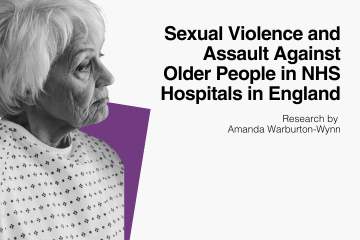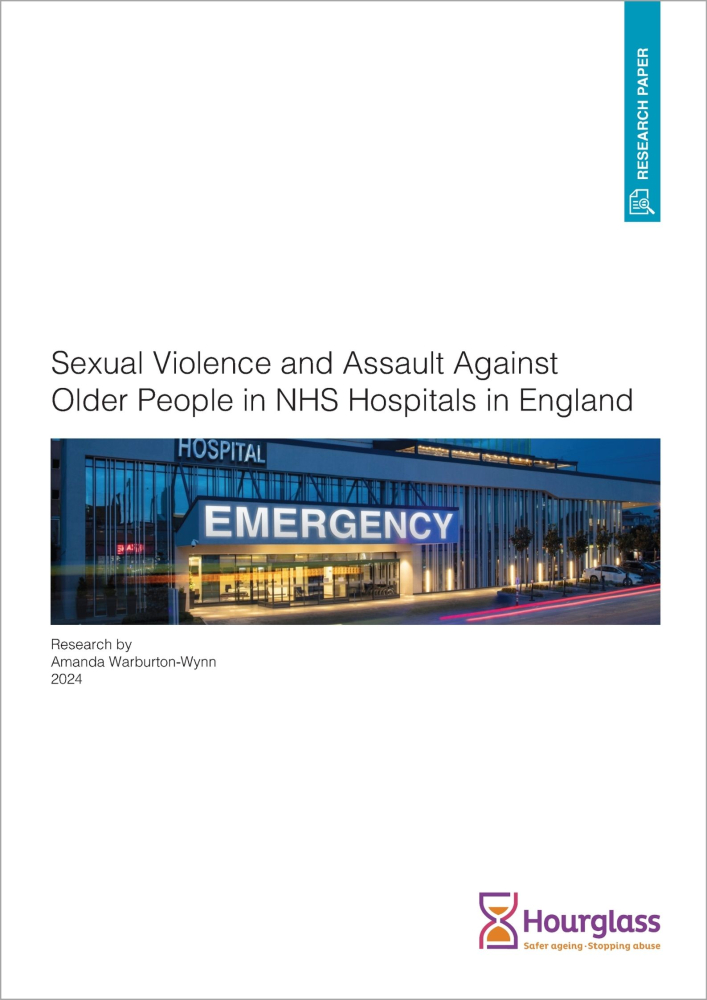
In 2021, Hourglass published eye-opening research by independent researcher Amanda Warburton-Wynn that lifted the lid on sexual violence against older people in hospitals in England. Three years later, Amanda has released an update to her original research.
The abuse of older people remains a taboo subject, but there is no subject more taboo than the sexual abuse of older people. While swathes of the public have become more conscious of sexual abuse in the wake of social and cultural movements, such as ‘Me Too’, you won’t often find older people involved in online conversations or being featured on mainstream news.
But the sexual abuse of older people continues to occur, under-reported and unrecognised. In 2020, Hourglass research revealed some worrying findings, with 1 in 3 UK residents believing that inappropriate sexual acts directed at older people don’t constitute abuse.
From 2019-2022, Hourglass’ helpline saw an increase year on year in the amount of cases where sexual abuse is mentioned, with 229 total cases reported to our helpline over this period. However, sexual abuse is often unreported with 83% of women who are raped not reporting this to authorities. It is, as such, likely that our 229 reported cases in the last four years are the tip of an invisible iceberg.
In 2021, we worked with Amanda Warburton-Wynn, independent researcher, trainer and consultant in domestic and sexual abuse, on a ground-breaking piece of research inspired by the case of Valerie Kneale, who passed away in November 2018 in a Blackpool Hospital. Her death was attributed to a stroke, however a postmortem examination found that she had in fact passed away due to internal hemorrhaging due to severe vaginal injuries following rape. As of writing, the perpetrator has not yet been found.
Three years after the original research was published, Amanda has updated her findings with some shocking results. In the intervening years since, the issue of sexual abuse of older people by hospital staff in England has increased dramatically. In 2021-2024, 274 allegations of sexual assault of older people in hospitals were recorded by NHS trusts in England, compared to 75 alleged cases in the original report.
While data collection and provision by these NHS trusts remains poor, in cases were data was available, the research found even more shocking results, including allegations not reported to the police by NHS trusts. Over a third went unreported and where information was given, high numbers of cases were closed as ‘No Further Action’.
Furthermore, victim-survivors were often not referred to a Sexual Assault Referral Centre (SARC) or a specialist support service. Amanda suggests that this could be due to victims declining referral, they may have self-referred or the Trust simply did not find it beneficial to refer. It may also be a troubling indication of pervasive common rape myths, that sexual violence only happens to younger, attractive women. This is referred to as the ‘real rape’ myth and has contributed to older people being excluded from sexual violence prevention and awareness raising campaigns.
We spoke to Amanda on her research and what needs to change to prevent the sexual abuse of older people in hospitals:
Why do you think that the abuse of older people in hospitals isn't often being spoken about in the mainstream media?
Sexual abuse of older people is a taboo subject - as recognised in the webinar Hourglass held on the topic - so it's something that people don't want to think about. It's also assumed that hospitals are a safe place where people will be cared for, not abused.
What was the most challenging part of the research project?
Whilst I knew this was happening, I didn't expect to see such a high number of incidents (at least 75 in five years). Relating each report back to an individual older person, and then considering that sexual assault is significantly under-reported so the real figure is likely to be much higher, was shocking. Also, in most incidents the hospital didn't have a record of any police outcome and, where a police outcome was known, almost all cases were classed No Further Actioned (NFA). This is especially worrying as the perpetrator could be still carrying out sexual assaults.
What would you like to see the government and/or the NHS do to prevent cases such as these from occurring?
I think there are several issues that need addressing - first is consistent and mandatory recording of such incidents as some were recorded as 'safeguarding' issues and others as 'patient safety' which can lead to different processes and outcomes.
I think there needs to be more emphasis on believing older patients and thorough investigation including involving local Sexual Assault Referral Centres to do on-site forensics. I think there also needs to be significant review at the criminal justice level - when a victim makes the brave decision to report to the police, the system is set against them.
In my research, victims reported incidents happening whilst under or recovering from anesthesia or whilst heavily medicated, which meant they were, unsurprisingly, unable to identify the perpetrator or give a detailed description of what happened so the case was not proceeded with.
What was the most surprising finding from the 2024 update to the report?
The most surprising thing was the number of incidents being so much higher than last time although over a shorter period. Of course, the increase in number of Trusts responding this time could account for some of the increase, as well as potentially better recording of such incidents since the last research. But it is still a shocking number of incidents against a likely near zero criminal justice response.
Research Paper by Amanda Warburton-Wynn
 Sexual Violence and Assault against Older People in Hospitals in England - 2024
Sexual Violence and Assault against Older People in Hospitals in England - 2024
Hourglass has worked with Researcher Amanda Warburton-Wynn to publish an updated research piece, which reveals how the sexual violence and assault against older people in hospitals has changed since 2021.
Read the full research paper here
Just earlier this year, Hourglass was invited by the BBC to work with Eastenders scriptwriters on a long-term storyline centred around the sexual assault of an older person. The storyline was lauded, receiving high-praise from audiences and critics alike, with Angela Wynter winning a RadioTimes Best Actor award for her performance.
Still however, these examples are the exceptions, rather than the norm. Hourglass is still fighting for coverage, despite an estimated 2.6 million older people being affected by abuse each and every year, rising cases reported to our helpline and a rapidly ageing population. It’s more important than ever to shine a light on these cases, expose systemic issues and campaign for change.
This is why our Older Age, Tomorrow’s Hope (OATH) campaign is so important. Older people are victims of the same forms of abuse as all other age groups, yet their voices are rarely heard. By taking the OATH, you will be joining a growing crowd of people creating a voice so loud that it cannot be ignored any longer. We want to see a Safer Ageing Society by 2050 and we’re calling on you to join us: https://wearehourglass.org/oath
You can watch our webinar on the sexual abuse of older people, where we were joined by Amanda, LimeCulture CIC, The Revenge Porn Helpline and more: https://www.youtube.com/watch?v=AUvhvFXIP6M&t=4s
Read our policy brief on the sexual abuse of older people here
If you’ve been affected by any of the topics raised in this article, or are concerned about an older person in your life, you can contact our 24/7 helpline for free on 0808 808 8141. You can also visit our services page for more of our helpline services, such as our instant messenger and chatbot: www.wearehourglass.org
 Shop Now
Shop Now